
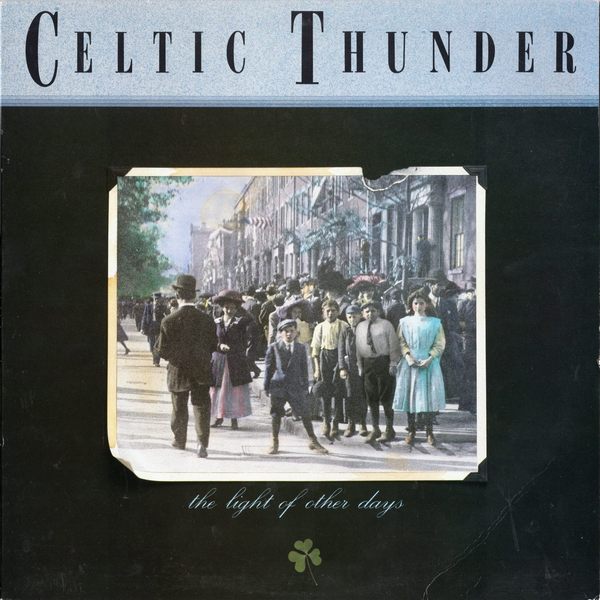 |
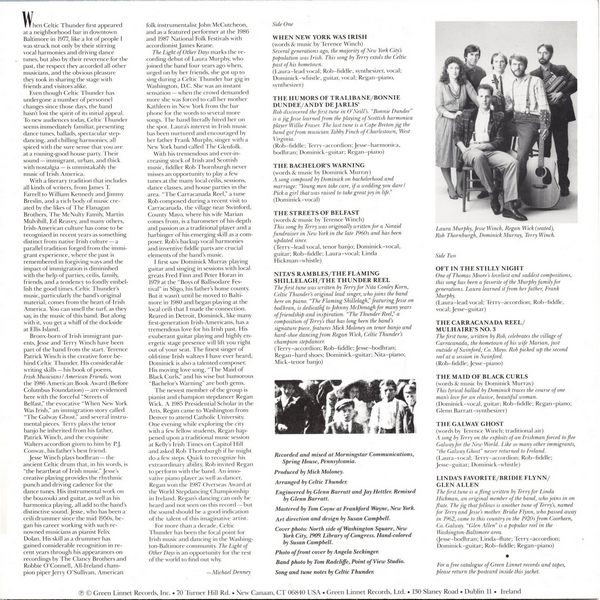
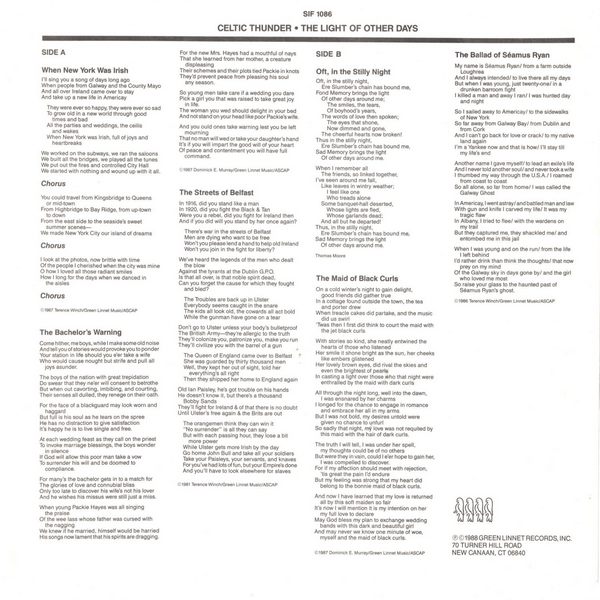
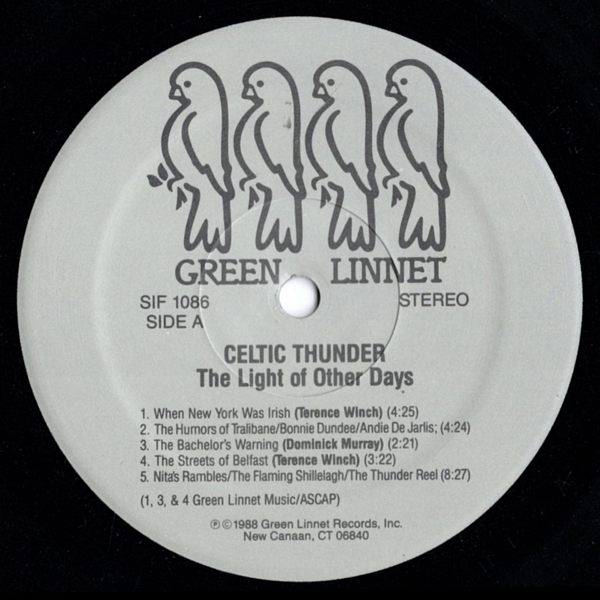
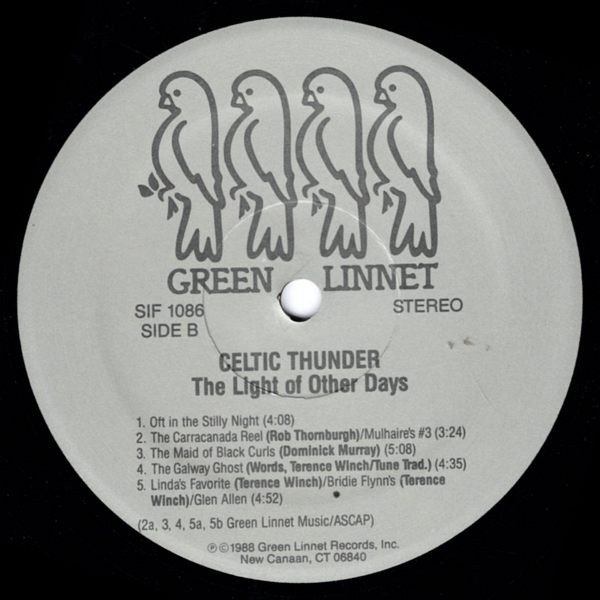 |
Sleeve Notes
When Celtic Thunder first appeared at a neighborhood bar in downtown Baltimore in 1977, like a lot of people I was struck not only by their stirring vocal harmonies and driving dance tunes, but also by their reverence for the past, the respect they accorded all other musicians, and the obvious pleasure they took in sharing the stage with friends and visitors alike.
Even though Celtic Thunder has undergone a number of personnel changes since those days, the band hasn't lost the spirit of its initial appeal. To new audiences today, Celtic Thunder seems immediately familiar, presenting dance tunes, ballads, spectacular stepdancing, and chilling harmonies, all spiced with the sure sense that you are at a rousing-good house party. Their sound — immigrant, urban, and thick with nostalgia — is unmistakably the music of Irish America.
With a literary tradition that includes all kinds of writers, from James T. Farrell to William Kennedy and Jimmy Breslin, and a rich body of music created by the likes of The Flanagan Brothers, The McNulty Family, Martin Mulvihill, Ed Reavey, and many others, Irish-American culture has come to be recognized in recent years as something distinct front native Irish culture — a parallel tradition forged from the immigrant experience, where the past is remembered in forgiving ways and the impact of immigration is diminished with the help of parties, ceilis, family, friends, and a tendency to fondly embellish the good times. Celtic Thunder's music, particularly the band's original material, comes from the heart of Irish America. You can smell the turf, as they say, in the music of this band. But along with it, you get a whiff of the dockside at Ellis Island.
Bronx-born of Irish immigrant parents, Jesse and Terry Winch have been part of the band from the start. Terence Patrick Winch is the creative force behind Celtic Thunder. His considerable writing skills — his book of poems, Irish Musicians — American Friends, won the 1986 American Book Award (Before Columbus Foundation) — are evidenced here with the forceful "Streets of Belfast," the evocative "When New York Was Irish," an immigration story called "The Galway Ghost," and several instrumental pieces. Terry plays the tenor banjo he inherited from his father, Patrick Winch, and the exquisite Walters accordion given to him by P.J. Conway, his father's best friend.
Jesse Winch plays bodhran — the ancient Celtic drum that, in his words, is "the heartbeat of Irish music." Jesse's creative playing provides the rhythmic punch and driving cadence for the dance tunes. His instrumental work on the bouzouki and guitar, as well as his harmonica playing, all add to the band's distinctive sound. Jesse, who has been a ceili drummer since the mid 1950s, began his career working with such renowned musicians as pianist Felix Dolan. His skill as a drummer has gained considerable recognition in recent years through his appearances on recordings by The Clancy Brothers and Robbie O'Connell, All-Ireland champion piper Jerry O'Sullivan, American folk instrumentalist John McCutcheon, and as a featured performer at the 1986 and 1987 National Folk Festivals with accordionist James Keane.
The Light of Other Days marks the recording debut of Laura Murphy, who joined the band four years ago when, urged on by her friends, she got up to sing during a Celtic Thunder bar gig in Washington, D.C. She was an instant sensation — when the crowd demanded more she was forced to call her mother Kathleen in New York from the bar phone for the words to several more songs. The band literally hired her on the spot. Laura's interest in Irish music has been nurtured and encouraged by her father Frank Murphy, singer with a New York band called The Glenfolk.
With his tremendous and ever-in-creasing stock of Irish and Scottish music, fiddler Rob Thornburgh never misses an opportunity to play a few tunes at the many local ceilis, sessions, dance classes, and house parties in the area. "The Carracanada Reel," a tune Rob composed during a recent visit to Carracanada, the village near Swinford, County Mayo, where his wife Marian comes from, is a barometer of his depth and passion as a traditional player and a harbinger of his emerging skill as a composer. Rob's backup vocal harmonies and inventive fiddle parts are crucial elements of the band's music.
I first saw Dominick Murray playing guitar and singing in sessions with local greats Fred Finn and Peter Horan in 1979 at the "Boys of Ballisodare Festival" in Sligo, his father's home county. But it wasn't until he moved to Baltimore in 1980 and began playing at the local ceili that I made the connection. Reared in Detroit, Dominick, like many first-generation Irish-Americans, has a tremendous love for his Irish past. His exuberant guitar playing and highly energetic stage presence will lift you right out of your seat. The finest singer of old-time Irish waltzes I have ever heard, Dominick is also a talented composer. His moving love song, "The Maid of Black Curls," and his wise but humorous "Bachelor's Warning" are both gems.
The newest member of the group is pianist and champion stepdancer Regan Wick. A 1985 Presidential Scholar in the Arts, Regan came to Washington from Denver to attend Catholic University. One evening while exploring the city with a few fellow students, Regan happened upon a traditional music session at Kelly's Irish Times on Capitol Hill and asked Rob Thornburgh if he might do a few steps. Quick to recognize his extraordinary ability, Rob invited Regan to perform with the band. An innovative piano player as well as dancer, Regan won the 1987 Overseas Award at the World Stepdancing Championship in Ireland. Regan's dancing can only be heard and not seen on this record — but the sound should be a good indication of the talent of this imaginative artist.
For more than a decade, Celtic Thunder has been the focal point for Irish music and dancing in the Washington-Baltimore community. The Light of Other Days is an opportunity for the rest of the world to find out why.
Michael Denney
When New York Was Irish — Several generations ago, the majority of New York City's population was Irish. This song by Terry extols the Celtic past of his hometown.
Laura — Lead Vocal; Rob — Fiddle, Synthesizer, Vocal; Dominick — Whistle, Guitar, Vocal; Regan — Piano, Synthesizer
The Humors Of Tralibane, Bonnie Dundee & Andy Dejarlis — Rob discovered the first tune in O'Neill's. "Bonnie Dundee" is a jig Jesse learned from the playing of Scottish harmonica player Willie Fraser. The last tune is a Cape Breton jig the band got from musician Tabby Finch of Charlestown, West Virginia.
Rob — Fiddle; Terry — Accordion; Jesse — Harmonica, Bodhran; Dominick — Guitar; Regan — Piano
The Bachelor's Warning — A song composed by Dominick on bachelorhood and marriage: "Young men take care, if a wedding you dare / Pick a girl that was raised to take great joy in life."
Dominick — Vocal
The Streets Of Belfast — This song by Terry was originally written for a Noraid fundraiser in New York in the late 1960s and has been updated since.
Terry — Lead Vocal, Tenor Banjo; Dominick — Vocal, Guitar; Rob — Fiddle; Laura — Vocal; Linda Hickman — Whistle
Nita's Rambles, The Flaming Shillelagh & The Thunder Reel — The first tune was written by Terry for Nita Conley Korn, Celtic Thunder's original lead singer, who joins the band here on piano. "The Flaming Shillelagh" featuring Jesse on bodhran, is dedicated to Johnny McDonagh for many years of friendship and inspiration. "The Thunder Reel," a composition of Terry's that has long been the band's signature piece, features Mick Moloney on tenor banjo and hard-shoe dancing from Regan Wick, Celtic Thunder's champion stepdancer.
Terry — Accordion; Rob — Fiddle; Jesse — Bodhran; Regan — Hard Shoes; Dominick — Guitar; Nita — Piano; Mick — Tenor Banjo
Oft In The Stilly Night — One of Thomas Moores loveliest and saddest compositions, this song has been a favorite of the Murphy family for generations. Laura learned it from her father, Frank Murphy.
Laura — Lead Vocal; Terry — Accordion; Rob — Fiddle, Vocal; Jesse — Guitar
The Carracanada Reel & Mulhaire's No. 3 — The first tune, written by Rob, celebrates the village of Carracanada, the hometown of his wife Marian, just outside of Swinford, Co. Mayo. Rob picked up the second reel at a session in Swinford.
Rob — Fiddle; Jesse — Piano
The Maid Of Black Curls — This lyrical ballad by Dominick traces the course of one man's love for an elusive, beautiful woman.
Dominick — Vocal, Guitar; Rob — Fiddle; Regan — Piano; Glenn Barratt — Synthesizer
The Galway Ghost — A song by Terry on the exploits of an Irishman forced to flee Galway for the New World. Like so many other immigrants, "the Galway Ghost" never returned to Ireland.
Laura — Vocal; Terry — Accordion; Rob — Fiddle; Jesse — Guitar; Dominick — Whistle
Lindas Favorite, Bridie Flynn & Glen Allen — The first tune is a fling written by Terry for Linda Hickman, an original member of the band, who joins in on flute. The jig that follows is another tune of Terry's, named for Terry and Jesse's mother. Bridie Flynn, who passed away in 1962, came to this country in the 1920s from Coorheen, Go. Galway. "Glen Allen" is a popular reel in the Washington-Baltimore area.
Jesse — Bodhran; Linda — Flute; Terry — Accordion; Dominick — Guitar; Rob — Fiddle; Regan — Piano